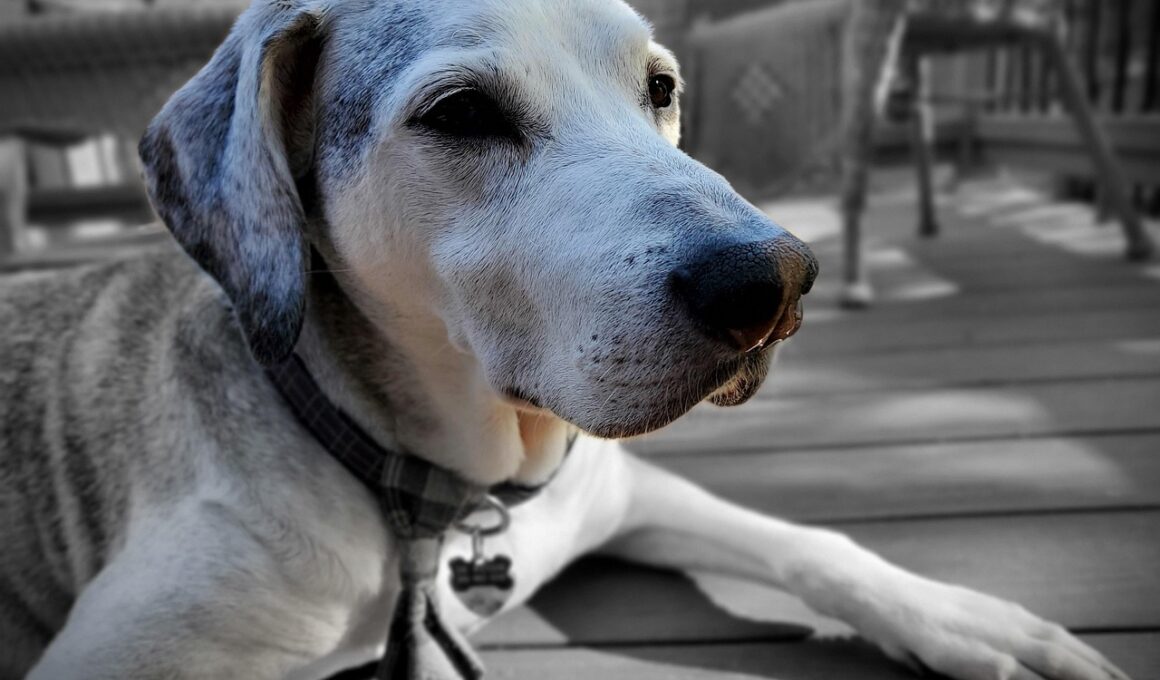How to Recognize When Your Senior Dog Needs Specialized Care
As dogs age, their needs change, and attentive owners should be sensitive to these evolving requirements. Regular veterinary check-ups are essential for monitoring their health. However, there are signs that may indicate the need for specialized care. If you notice a shift in your dog’s behavior, such as increased lethargy or sudden aggression, it might signify pain or discomfort. Another key indicator is changes in appetite. A decline or sudden increase in hunger can indicate health issues that need addressing. Pay close attention to their mobility as well; if your dog is hesitant to walk or struggles with stairs, these may be indicators of arthritis or other joint problems. Outdoor activities should also be modified to suit their energy levels while still keeping them engaged. Additionally, looking at their coat and grooming habits can reveal underlying conditions. Regularly check for skin changes or unusual odors. This holistic approach will help you assess if your senior dog requires specialized care to enhance their quality of life.
Being proactive about your senior dog’s diet is crucial as they continue to age. Nutrition plays a vital role in maintaining their health and metabolism. As your dog ages, their metabolism slows down, requiring adjustments in their diet. Switching to senior-specific pet food offers balanced nutrients. You should also consider the dog’s dental health, as poor dental hygiene can lead to more serious problems. Look for signs of tartar buildup or gum disease, as these conditions can cause discomfort. Keep a close eye on your dog’s weight; obesity can exacerbate health problems, including diabetes and joint issues. Incorporating supplements such as Omega-3 fatty acids can support joint health and promote a shiny coat. Staying hydrated is equally important; ensure fresh water is available at all times. Regular vet consultations can provide specific dietary advice tailored to your dog’s needs. Adding fruits and vegetables can enrich their diet, too, but be cautious about harmful food. In conclusion, a well-rounded diet combined with careful monitoring will help improve your senior dog’s longevity and overall wellness.
Recognizing Behavioral Changes
Behavioral changes can greatly signal when your senior dog requires specialized care. Any sudden alterations in mood, energy, or social behaviors merit attention. For instance, if a previously active dog becomes reclusive or anxious, this could suggest underlying pain. Dogs communicate through their actions; watch for signs of irritation when touched or approached. Furthermore, changes in their response to commands or training efforts could also denote cognitive decline. In some instances, dogs might become disoriented or confused in familiar surroundings. Associative memory problems can arise as dogs age, leading to difficulty performing established routines. If you see increased or decreased barking, it may reflect discomfort or anxiety. Critical changes in sleeping patterns can also be alarming. Senior dogs often develop strange sleep habits or insomnia that interrupts their rest. Addressing these behavioral changes with your veterinarian can provide insight into their mental and emotional health. Therapy or medications may be necessary for specific conditions, ensuring your beloved pet receives the care they deserve, promoting a comfortable and enriched life in their golden years.
Physical health considerations are instrumental in determining when a senior dog requires specialized care. Symptoms like excessive panting, coughing, or difficulty breathing can indicate serious health issues. It is critical to observe patterns in their physical mobility; signs of limping or hesitation to jump could suggest arthritis or injury. Moreover, a noticeable increase in water consumption or frequent urination may hint at chronic conditions, including diabetes or kidney disease. Regular weight checks are necessary, as significant weight loss or gain may warrant immediate veterinary evaluation. Chronic diarrhea or constipation can lead to severe dehydration and require prompt attention. Consequently, maintaining an updated health journal can help track any concerning changes, enabling clearer communication with your veterinarian. Consider implementing an exercise routine tailored to your dog’s abilities. Gentle walks can promote joint health, while mental stimulation through games keeps them engaged and sharp. Always assess their recovery from physical activities, as their recuperation time may differ compared to younger dogs. By prioritizing their physical health and engaging with your vet, you can extend your senior dog’s quality of life significantly.
The Importance of Regular Health Assessments
A crucial aspect of senior dog care is committing to regular health assessments. These evaluations provide valuable insights into your dog’s overall well-being. The frequency of vet visits may vary; however, it is advisable to schedule biannual check-ups for senior dogs. During these visits, your veterinarian will conduct a comprehensive physical examination and discuss any observed behavioral or dietary changes. Blood tests, urinalysis, and other diagnostics may be required to check for hidden issues. Early detection of age-related conditions is key to effective management and treatment. Conditions such as heart disease, renal failure, and cancer may go unnoticed until they have progressed significantly. Moreover, discussing preventive care options, such as vaccinations and parasite control, ensures your dog’s immune system remains robust. Continuing dental care is equally important; professional cleanings can mitigate oral health problems. During these visits, inquire about dietary recommendations specific to aging dogs. Remember, proactive communication with your vet will lead to tailored care strategies, ensuring your beloved senior dog remains healthy and content well into their golden years.
Socialization is often an overlooked aspect of senior dog care but is crucial for their emotional well-being. Engaging with other pets and people can greatly reduce feelings of isolation and anxiety. Frequent social interactions help stimulate their minds and promote healthier aging. While older dogs might prefer quieter environments, maintaining a balance of social activities is essential. Consider enrolling your senior dog in low-impact classes aimed at older pets for gentle exercise and socialization. Visiting dog parks during off-peak hours allows for gradual acclimatization to different situations. If your dog has specific dislikes, be careful not to expose them to overwhelming circumstances that may lead to stress. Incorporating structured activities like grooming or training sessions can foster bonding between you and your pet, enhancing their comfort level. Keep their favorite toys or familiar scents in social settings to create a calming effect. Positive reinforcement during social engagements will encourage desired behaviors, such as gentle play. Ultimately, a well-rounded social life contributes significantly to emotional health, positively influencing your senior dog’s mental state and overall joy.
Adapting the Home Environment
Creating a supportive home environment is a key part of senior dog care. As your dog ages, accommodations can make a significant difference in their comfort and safety. One prevalent concern is mobility; consider ramps or non-slip mats to prevent slips and falls around the house. Keeping essential items, such as food and water bowls, within easy reach will allow them to maintain independence. Providing cozy bedding in areas where they frequently rest helps alleviate joint pain. Creating a safe space free from unnecessary clutter will reduce the risk of injury during navigation. Moreover, maintaining a consistent routine aids your senior dog’s mental clarity and fosters a sense of security. Regularly check for potential hazards, such as sharp objects, which could pose a danger. Re-evaluating the location of food, water, and litter boxes based on their habits may help streamline their daily activities. Introducing soft lighting can also assist with nighttime navigation, enhancing safety during late hours. Finally, consider providing engaging toys that challenge their mind while accommodating their physical limitations. Fostering a supportive environment ultimately improves your senior dog’s quality of life and promotes their happiness.
The commitment to caring for a senior dog involves attentiveness and informed decision-making. It is essential to listen to their needs and make necessary adjustments in their environment and healthcare. By recognizing the signs that indicate a need for specialized care, you can ensure they remain comfortable and healthy during their golden years. A balanced diet, regular vet check-ups, and modifications to your home will play a crucial role. Additionally, keep their social lives engaging while prioritizing physical and mental health. It is your responsibility as a pet owner to be proactive about their changing needs. Empower yourself through education and advocacy for your pet’s health; internet resources and local dog clubs can help. Regularly incorporating preventive measures and monitoring their behavior can significantly enhance their quality of life. Cherishing your time with them will strengthen the bond you share and potentially lead to an enriched companionship. Ultimately, the love and care you provide will always reflect in the wag of their tail and the joy in their eyes, ensuring a fulfilling life for your beloved senior dog.


